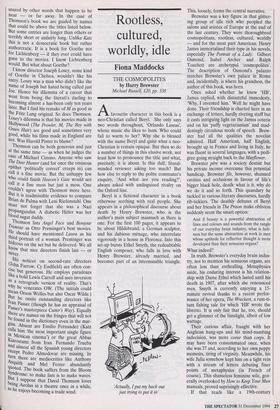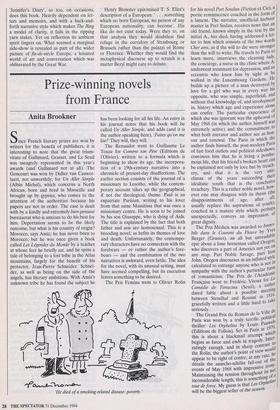Rootless, cultured, worldly, idle
Fiona Maddocks
THE COSMOPOLITES by Harry Brewster Michael Russell, f20, pp. 338 Afavourite character in this book is a neo-Christian called Beryl. She only says two words throughout, 'Orlando Lassus', whose music she likes to hum. Who could fail to warm to her? Why she is blessed with the name Beryl and quite what a neo- Christian is remain opaque. But then so do a number of things in this elusive work, not least how to pronounce the title and what, precisely, it is about. Is this dull, literal- minded reviewer asking too much? But how else to reply to the polite commuter's enquiry, 'And what are you reading?', always asked with undisguised rivalry on the Oxford line.
Beryl is a fictional character in a book otherwise seething with real people. She appears in a philosophical discourse about death by Henry Brewster, who is the author's main subject inasmuch as there is one. For the first 100 pages, it appears to be about Hildebrand, a German sculptor, and his dubious menage, who interrelate vigorously in a house in Florence. Into this set-up bursts Ethel Smyth, the redoubtable English composer, who falls in love with Henry Brewster, already married, and becomes part of an interminable triangle.
Actually, I put my back out just trying to put it in' This, loosely, forms the central narrative.
Brewster was a key figure in that glitter- ing group of idle rich who peopled the salons and soirees of Europe at the end of the last century. They were thoroughbred cosmopolitans, rootless, cultured, worldly — and for the most part American. Henry James immortalised their type in his novels, especially The Portrait of a Lady. Gilbert Osmond, Isabel Archer and Ralph Touchett are archetypal 'cosmopolites'. The description of Osmond's palazzo matches Brewster's own palace in Rome and, incidentally, is where his grandson, the author of this book, was born.
Once asked whether he knew `HB', James replied, with distasteful immodesty, `Why, I invented him.' Well he might have done. Their friendship is charted here in an exchange of letters, hardly riveting stuff but it casts intriguing light on the James coterie and on his 'puffy vegetarianism' and mad- deningly circuitous mode of speech. Brew- ster had all the qualities the novelist admired. Half American, half English, brought up in France and living in Italy, he was fluent in several languages, with a pedi- gree going straight back to the Mayflower.
Brewster pere was a society dentist but his private income overcame this potential handicap. Brewster fib, however, shunned cavities and occlusions in favour of life's bigger black hole, death: what is it, why do we do it and so forth. This quandary he tackled in various literary discourses, hardly rib-ticklers. The deathly debates of Beryl and her friends in The Prison make oblivion suddenly seem the smart option:
And if beauty is a powerful abstraction of lines and colours and sounds from the tangle of our everyday brain industry, what is holi- ness but the same abstraction at work in men whose aptitude for reflective thought is more developed than their sensuous organs?
What indeed?
In truth, Brewster's everyday brain indus- try, not to mention his sensuous organs, are often less than enthralling. Metaphysics aside, his enduring interest is his relation- ship with Dame Ethel which lasted until his death in 1907, after which she renounced men. Smyth is currently enjoying a 15- minute revival thanks to a recent perfor- mance of her opera, The Wreckers, a rum-ti- tuna fishing tale for which `HB' wrote the libretto. It is only fair that he, too, should get a glimmer of the limelight, albeit of low wattage.
Their curious affair, fraught with her Anglican hang-ups and his mind-numbing indecision, was more coeur than corps. It may have been consummated once, when she was 37 and, according to her own peppy memoirs, tiring of virginity. Meanwhile, his wife Julia somehow kept him on a tight rein with a stream of letters debating finer points of metaphysics (in French of course). This shameless feminine wile, gen- erally overlooked by How to Keep Your Man manuals, proved suprisingly effective.
If that reads like a 19th-century `Jennifer's Diary', so too, on occasions, does this book. Heavily dependent on let- ters and memoirs, and with a back-and- forth narrative style which makes The Ring a model of clarity, it fails in the ripping yarn stakes. Yet on reflection its ambient spirit lingers on. What seemed a marginal side-show is revealed as part of the wider picture of fin-de-siecle Europe, a leisured world of art and conversation which was obliterated by the Great War. Henry Brewster epitomised T. S. Eliot's description of a European: . . . something which no born European, no person of any European nationality, can become'. His like do not exist today. Were they to, on that analysis they would doubtless find refuge in the corridors of Strasbourg or Brussels rather than the palazzi of Rome or Florence. Whether they would find the metaphysical discourse up to scratch is a matter Beryl might care to debate.



























































 Previous page
Previous page